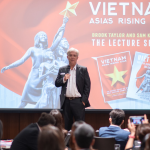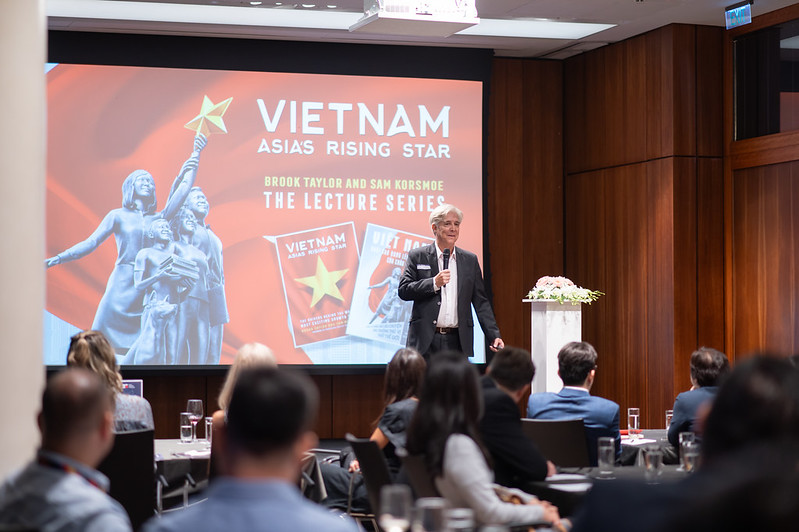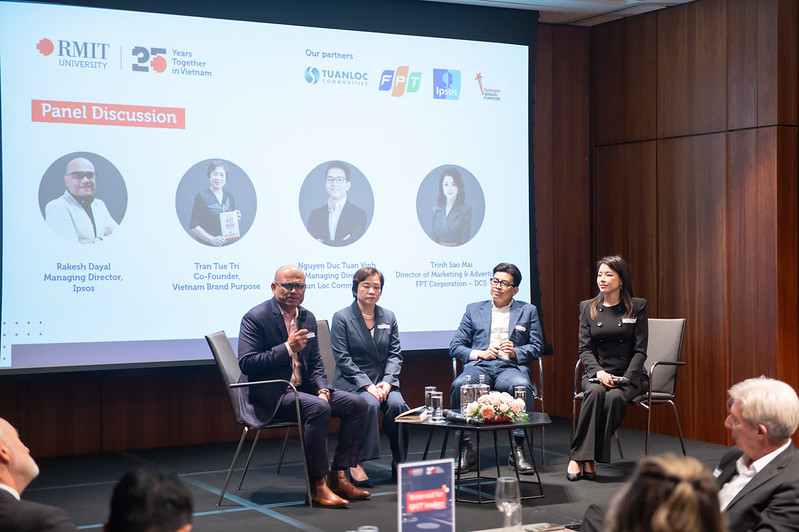
Made in Vietnam, Known Worldwide: A New Era for Vietnamese Enterprises

In celebrating the 50th anniversary of reunification, author Sam Korsmoe reflects on Vietnam’s economic rise and addresses a challenging question from RMIT alumni: When will Vietnam stop the ‘rising star’ era and finally emerge as a true economic leader in Asia, like Korea or Taiwan?
At the latest Alumni to Alumni Circle (A2A) hosted by RMIT Vietnam Alumni Relations, author and long-time Vietnam resident Sam Korsmoe shared his reflections on the nation’s economic transformation. Having lived in Vietnam for over two decades, Korsmoe highlighted the unique blend of historical, cultural, and political factors that have contributed to the country’s remarkable GDP growth, often in contrast to its relatively high poverty rate. He emphasized that Vietnam possesses at least 15 core strengths that, if leveraged effectively, could enable the country to keep pace with developed nations.
One of these key strengths is the role of women in Vietnamese society. Compared to developed economies such as South Korea and Taiwan, where women are often still expected to fulfill traditional roles, Vietnam has demonstrated a more inclusive attitude toward women in the workforce, particularly in the corporate sector.
Another strength is Vietnam’s strategic geographical location. Sharing a border with China and possessing an extensive coastline, the country holds strong potential as a global manufacturing hub. Additionally, Vietnam’s practice of “bamboo diplomacy” has enabled it to maintain a careful balance between the United States and China in the context of today’s new cold war.
While these advantages are promising, Korsmoe noted that several challenges remain, including income inequality, potential reversals in free trade, and external pressures such as tariffs from the U.S. under Trump’s government. Still, he expressed cautious optimism, suggesting that the combination of these strengths could drive Vietnam toward a more prominent role in the global economy.

Sam Korsmoe – co-author of the book Vietnam, Asia’s rising star, represented at the event as the guest speaker
In continuation of the challenge addressing, the panelists of Vietnamese entrepreneurs joined in to share their insights on how they tackled these issues and expanded beyond the border.

From left to right: Rakesh Dayal – Managing Director at Ipsos plays a role as the moderator, and the panelists including Tran Tue Tri – Co-founder of Vietnam Brand Purpose, Nguyen Duc Tuan Vinh – Managing Director at Tuan Loc Commodities, Trinh Sao Mai – Director of Marketing & Advertising at FPT Corporation (DC5)
Mr. Vinh Nguyen, Managing Director of Tuan Loc Commodities, recounted his journey of transforming a small local coffee business into a million-dollar exporter. To reduce costs and improve efficiency, he streamlined the company’s global supply chain from five or six stages to just three. Vinh emphasized that there is no universal formula for business success. Instead, he highlighted the importance of maintaining confidence and patience in the face of a constantly shifting market landscape.
Ms. Tri Tran, co-founder of Vietnam Brand Purpose and a seasoned expert in the retail and consumer goods industry, added her perspective on building brand value. She stressed that selecting the right people at the right time and establishing a strong reputation are essential to international success. Despite the high quality of many Vietnamese products and services, she noted that a lack of effective brand-building strategies often holds them back on the global stage. She cited the growing quality of Vietnamese media productions, such as the concert “Anh Trai Vượt Ngàn Chông Gai”, as examples of how local brands are narrowing the gap with international standards.
From a corporate standpoint, Ms. Mai Trinh, Director of Marketing & Advertising at FPT Corporation (DC5), discussed how FPT entered the Southeast Asian market over a decade ago. In a bold and forward-thinking move, the company invested in talent development by sending employees to Singapore to gain local market insights. This was considered an unusual approach at the time. Today, FPT continues to prioritize bilingual talent and fosters a culture of innovation, often asking, “Why don’t we create our own version?” when inspired by international innovations.
In closing, Sam Korsmoe and the panelists addressed a critical question posed by the audience: “When will Vietnam stop being a rising star and finally emerge as a true economic leader in Asia, like Korea or Taiwan?”
While there is no definitive answer, the panel agreed that embracing the lessons of forgoers, staying adaptable, and being optimistic are the best strategies for Vietnamese businesses striving to compete on the global stage.
View the event photo album here: A2A April – “Made in Vietnam” goes global